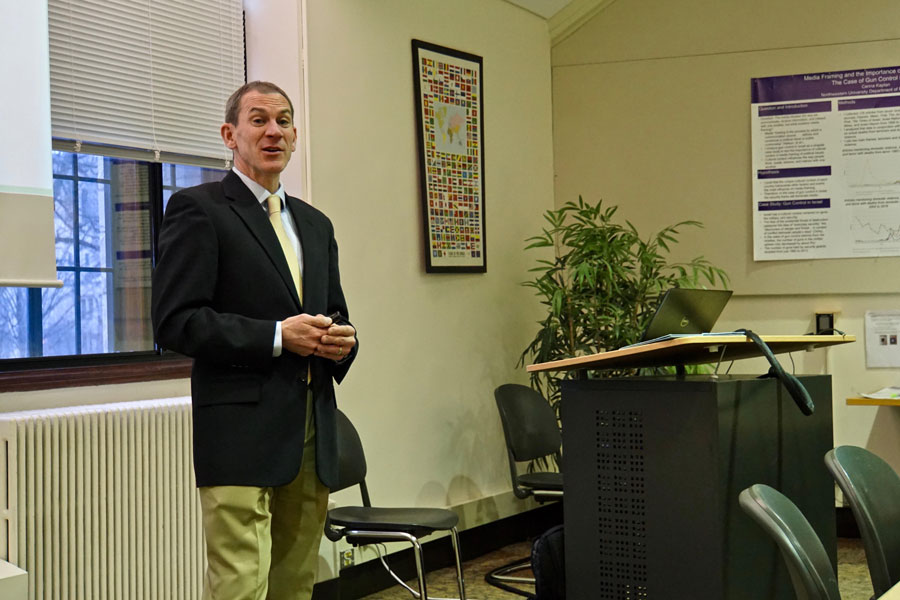Retired Col. Liam Collins: Russian withdrawal from Ukraine unlikely
Owen Stidman/Daily Senior Staffer
Col. Liam Collins speaks on Russian involvement in Ukraine. He presented on the role which hybrid warfare plays in modern Russian military operations.
January 31, 2020
Retired Col. Liam Collins discussed Thursday how Russia perfected its technique of hybrid warfare, culminating in the invasion of Ukraine in 2014.
Collins spoke in Scott Hall at a Russia Policy Forum series event — sponsored by the Russian, Eurasian and East European Studies Research Program and the political science department, saying Russia has a reliable method for wreaking havoc on its neighbor states and gaining political control over them. It is Russia’s key goal to prevent neighboring countries from entering the European Union or NATO, he explained. The country’s armed forces had advanced these methods through a series of conflicts starting with the Chechen war, Collins said.
While the Russian use of cyberwarfare has received a lot of publicity in recent years, Collins said what made the technique effective was Russia’s multi-pronged approach, known as “hybrid warfare.”
He said there is no clear definition of what hybrid warfare is, though generally it is used to describe the combination of conventional, indirect and information warfare.
“Russia showed us how you use cyber at the tactical level,” Collins said.
He explained that combining cyberwarfare with conventional, kinetic weapons is what proved highly effective for Russia in Ukraine.
In March 2014, Russia annexed the Crimean Peninsula from Ukraine following the earlier arrival of unmarked soldiers. Later, they provided covert support to armed uprisings in the country’s Donbass region in the east. In total, over 10,000 people have been killed.
A tentative peace agreement known as the Minsk Protocol has been in place since 2015, however daily clashes continue at the frontline.
Russia carried out hybrid warfare in Ukraine by mixing the use of volunteers and unmarked soldiers — irregular warfare — with open military support from Russia and a concerted propaganda effort, Collins explained.
He said while cyberwarfare received lots of media attention in the West, many methods deployed by Russia failed or had limited success.
“Ukraine was a testing ground for new Russian technology,” Collins said.
Collins said hybrid warfare had never been deployed as successfully by Russia prior to the Ukraine conflict. The first major example of a cyber strike came in the form of an attack on Estonian banks following the relocation of a statue in Tallinn, the country’s capital. Russia “failed the information war” in the invasion of Georgia one year later, Collins added.
However, Collins said Russia learned from its mistakes, pouring a substantial amount of resources into propaganda outlets such as RT and Sputnik, which are aimed at foreign audiences. In Ukraine, the vast majority of Russian-language stations were Russian-owned, giving them a significant information advantage, he said.
“Russia had a war plan for Crimea sitting on the shelf, and they were just waiting for an opportunity to go for it,” Collins said.
Political Science Prof. Jeff Rice attended the talk, saying that it was a “wonderful opportunity” to hear the analysis of someone who had such insight into both sides’ thinking.
“In the ongoing conflict between Russia and Ukraine, today’s talk provided a rigorous analysis of the logic behind Putin’s support for separatist rebels and Russian occupation of part of Ukraine,” Rice said in an email to The Daily.
The annexation of Crimea took just a few days and was carried out with minimum violence. The same can’t be said for the separatist areas of Eastern Ukraine, where fighting persists.
Despite little strategic value in the land itself, Collins said Russia is unlikely to withdraw its support for the self-proclaimed people’s republics.
“There is no chance that Russia will withdraw from the Donbass if they are going to lose face,” Collins said. “There is relatively little cost for them to just hold onto the land.”
Email: [email protected]
Twitter: @linus_at
Related Stories:
— Retired US general advocates for immediate military support in Ukraine
— Panelists offer closer look at Ukraine crisis in talk at Evanston library


